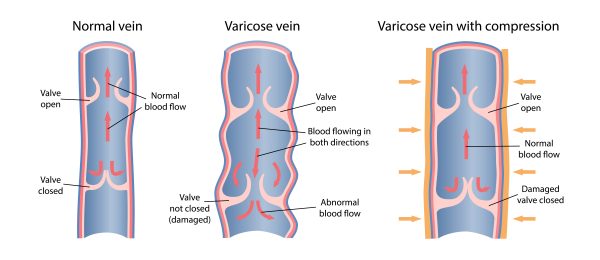Those who have a parent or grandparent with varicose veins may notice when their own veins start to look varicose. Others may suffer from symptoms but aren’t sure if they’re related to varicose veins or something else. For those who think they have a varicose vein and are wondering, now what? We are here to help.
Why do varicose veins develop?
Did you know that 1 in 3 Australians suffer? Due to the volume of cases, the causes are often varied. We know that lifestyle factors such as diet, exercise and jobs which require extended periods of standing, can contribute to vein damage. Women are particularly vulnerable as both pregnancy and the contraceptive pill can cause varicose veins. But the most common factor is that they are hereditary.
If you suspect varicose veins, a proper diagnosis from a doctor is the next step, helping you to understand what stage they’re at and what you can do about it. Whether it’s your regular GP or a vein specialist, having it looked at by a medical professional is important in determining whether it should be treated or if you can manage it at home.
While this advice is a great guide, a medically informed decision is the best way to have a positive long-term prognosis.
What’s important to know is that varicose veins themselves can’t be cured, only managed, as varicose veins themselves are symptomatic of an underlying issue, known as venous insufficiency. Removal of the veins doesn’t cure the condition, it just removes the primary symptom.
Not sure of the severity of your veins? Try our Vein Assessment Tool.
I think I have a varicose vein, now what?
Knowing whether it’s worth treating your veins is a question many people with varicose issues consider. Generally speaking, if varicose veins cause you lifestyle concerns such as aching legs, heaviness, swelling or skin changes treatment should certainly be considered after a consult with your doctor.
It is difficult to precisely determine how fast the veins will deteriorate but what is certain is that over time they will get worse.
Having your veins medically treated is a great way to restore function to the venous system in your legs. Whether it’s sclerotherapy, Endovenous Laser treatment or surgical removal of the veins, these methods work by closing off the veins themselves and redirecting the blood into healthier veins.
Like any kind of medical procedure, each one carries its own risks and benefits, however, laser treatment has been shown to have great results with minimal risks.
Treating veins is most often recommended when the symptoms are constant, particularly if they start to affect daily life.
Managing at home
Taking care of the veins yourself is something many people decide to do, especially if the veins are still relatively mild. Taking care of them at home is not effective in treating the vein or reversing the problem, but it can help to relieve the symptoms..
Try these tips to alleviate mild symptoms:
- Wear compression stockings daily to manage swelling and prevent heaviness in your legs.
- Walk regularly, at least twenty minutes a day. This will get the blood moving more effectively.
- Elevate your feet at the end of the day to allow the blood to come back to your heart.
Learn more: Do natural remedies work for varicose veins?
Varicose vein removal: Seek expert advice
The doctors at The Vein Institute specialise in varicose vein treatment. We offer patients a comprehensive program using non-surgical laser treatment techniques. You can learn more in our Definitive Guide to Varicose Vein Treatment.
The benefits of non-surgical varicose vein treatment are:
- Walk-in walk-out treatment
- 98% success rate
- Extremely effective
- Can be performed at a clinic (no hospitalisation)
- No general anaesthetic
- Medicare rebates apply
- No downtime or time away from work
To book a consultation and discuss our treatment program, call 1300 535 017 or make an enquiry via the Contact Us page.


